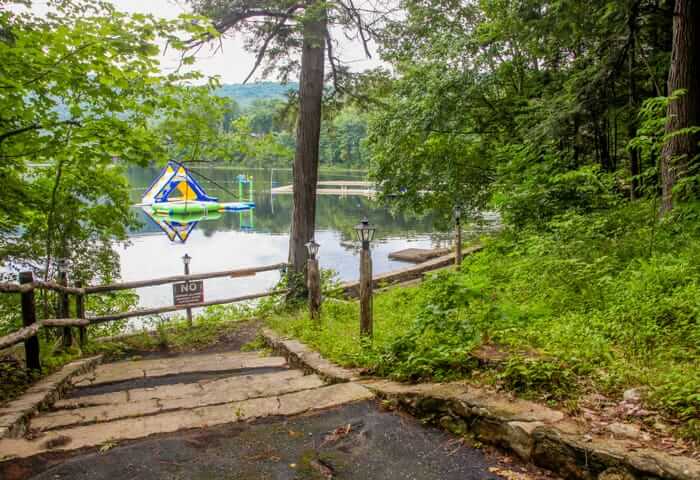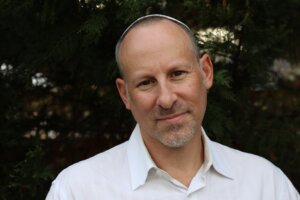Unless we teach our teens about consent, sexual assault at Jewish summer camps will continue
While educators have developed tools that can help teen boys develop healthier sexualities, very few camps are using them.

Graphic by Angelie Zaslavsky
In recent weeks, the Jewish community learned about a lawsuit involving a camper who sexually assaulted another camper at Camp Ramah in the Berkshires in 2018. While the U.S. Southern District Court of New York will weigh the issues regarding institutional responsibility, there is a familiar gender element to the case: This boundary-breaking, like far too many others, started with a male camper attacking a female camper.
Ramah is not alone among Jewish camps in having challenges with teen boys. Over the last decade in my role at Moving Traditions — an organization that works with Jewish preteens and teens and focuses on the intersection of gender, sexuality and well-being — I have spoken with dozens of camp and teen program directors in the Jewish world and beyond. The majority of their stories of harassment or assault are stories of boys that had to be sent home.
Teen boys and young men may understand cognitively that they are supposed to “practice consent” but that message may be clouded by visions of male aggression, defiance, control and coercion. And while educators have developed tools that can help teen boys unlearn these narrow codes of masculinity and develop healthier sexualities, very few camps are using them. In fact, some directors tell their staff that they should avoid discussions with campers about romance, relationships, or consent. They think that the staff is immature, so it is better to tell them not to discuss these topics.
Inevitably, however, some campers will explore romantic relationships or hook-ups, counselors will see it or hear about it, and as a result, staff ends up ignoring the guidance from supervisors and having inappropriate or clumsy conversations with campers with little to no guidance on these issues. We, as educators and Jewish professionals, have a responsibility to better support camp staff in understanding their role in helping campers to navigate boundaries, particularly boundaries of sex and sexuality, in the internet age.
From my perspective as a rabbi, a father of two sons who have worked as camp counselors, and as a trainer of hundreds of men who work with Moving Traditions’ programs for teen boys in Jewish institutions, I find today’s teen boys to be incredibly diverse and creative. In many ways, men today are free to be themselves, express a wider range of emotions and question codes of masculinity and conventions of dress and expression.
At the same time, almost all teen boys are exposed to sexual fantasies from video games, pornography, television and film that portray men as sexual aggressors or manipulators. They’re struggling to make sense of these competing ideas about masculinity, all during a global pandemic that prevented many opportunities for in-person connection and shifted many relationships online.
Informal educational spaces like Jewish summer camp, though far from perfect, are still a place where thousands of teen boys, and teens of all genders, turn off their screens and learn to be in relationships in healthy ways, listen to others, hold hands for the first time and kiss.
Last summer, I heard from the camp directors and other professionals that many teens came into the summer session hoping to turn an online flirtation or online fantasy into a reality. This has been one of the common challenges for today’s teens — moving from a digital flirtation into an in-person encounter. Some teens, in fact, have had 10 months of a digital relationship anticipating an in-person one, and need help in managing expectations and boundaries around these relationships.
We know from extensive research on sexual harassment training that when men feel targeted as the perpetrators during this training, they are even more inclined to break boundaries. When the training focuses on bettering the relational dynamics and managing expectations versus assigning blame to a particular gender, it is far more impactful.
Instead of telling counselors to avoid talking with campers about relationships, romance and consent, the following are a few ideas that Moving Traditions introduces to future counselors to help the preteens and teens they guide to navigate hookup culture:
“It is natural to have feelings for someone that you are attracted to. But just because you have a feeling doesn’t mean you have to tell someone about it or act on it.”
This idea is a reframing of an ancient teaching from Ben Zoma in the Mishnah: “Who is strong? One who controls passion.” It is normal to have passion — and to feel passionately attracted to others. But teens need help in pushing back on the constant talk about who is “hot” or who they want to “get with.” Learning how to better understand what we are attracted to and that we can all decide to act or not act based on those feelings is empowering.
“There is a difference between kissing someone and kissing with someone.”
This helps focus teen boys on some of the problems with “using” someone to satisfy their own needs and instead envision the flow of a mutually consensual act. While the language shift may be subtle, it refocuses attention to the other person in the act and their agency, rather than treating them as an invisible object acted upon. It also encourages teen boys to see themselves as the type of guy who would choose “kissing with.”
“It’s not a race; expect people to move at different speeds.”
One of the key messages that counselors can deliver to their teens today is this: Drop your preconceived expectations, be easy on yourself if things do not go exactly as planned and simply go at the “speed” at which your crush wants to move. Teens often create “point systems” or other ways of turning the activity of hooking up into a competition. When staff conveys that romance and sexuality are not a “race” they help teens to turn down the peer pressure voices in their heads.
As summer approaches, we are hopeful that many Jewish camps will make space for these conversations. It is possible to provide campers with a positive space to express themselves and form authentic physical connections with others, while also learning to respect boundaries through honest dialogue about sex and sexuality. This is an ongoing conversation, but if we continue to avoid it, we’ll have more assaults, more victims, and more lawsuits.
To contact the author, email [email protected].




















